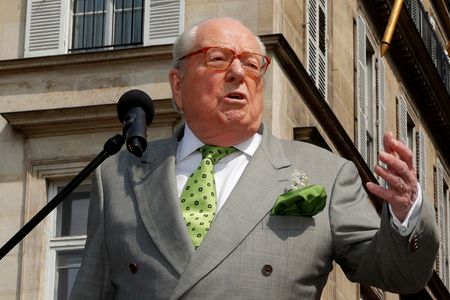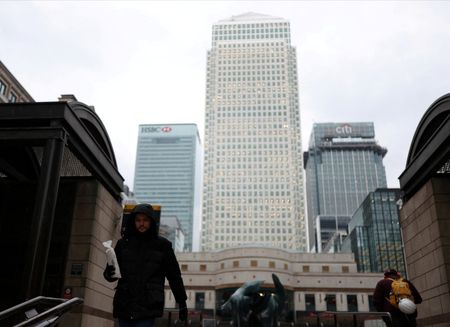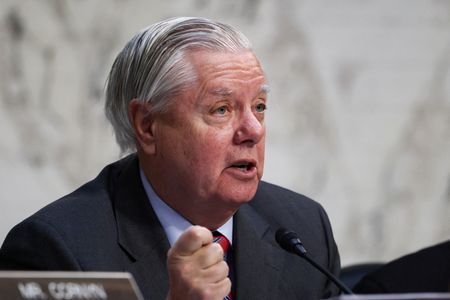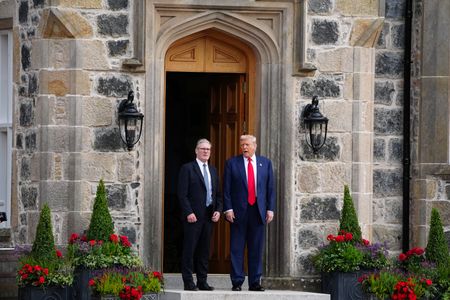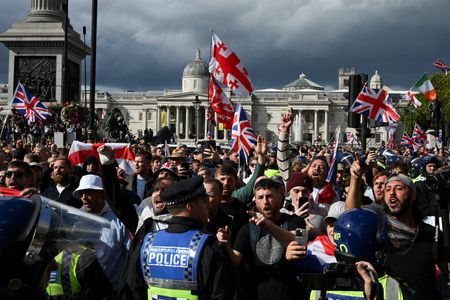By Elizabeth Pineau and Marine Strauss
PARIS(Reuters) -Jean-Marie Le Pen, the founder of France’s far-right National Front party who tapped into blue-collar anger over immigration and globalisation and revelled in minimising the Holocaust, died on Tuesday aged 96.
His death was confirmed by his daughter Marine Le Pen’s political party, National Rally (Rassemblement National).
Jean-Marie Le Pen spent his life fighting – as a soldier in France’s colonial wars, as a founder in 1972 of the National Front, for which he contested five presidential elections, or in feuds with his daughters and ex-wife, often conducted publicly.
Controversy was Le Pen’s constant companion: his multiple convictions for inciting racial hatred and condoning war crimes dogged the National Front.
His declaration that the Nazi gas chambers were “merely a detail” of World War Two history and that the Nazi occupation of France was “not especially inhumane” were for many people repulsive.
“If you take a book of a thousand pages on World War Two, in which 50 million people died, the concentration camps occupy two pages and the gas chambers ten or 15 lines, and that’s what one calls a detail,” Le Pen said in the late 1990s, doubling down on earlier remarks.
Those comments provoked outrage, including in France, where police had rounded up thousands of Jews who were deported to the Nazi death camp at Auschwitz.
Commenting on Le Pen’s death, President Emmanuel Macron said: “A historic figure of the far right, he played a role in the public life of our country for nearly seventy years, which is now a matter for history to judge.”
Le Pen helped reset the parameters of French politics in a career spanning 40 years that, harnessing discontent over immigration and job security, in some ways heralded Donald Trump’s rise to the White House.
He reached a presidential election run-off in 2002 but lost by a landslide to Jacques Chirac. Voters backed a mainstream conservative rather than bring the far right to power for the first time since Nazi collaborators ruled in the 1940s.
Le Pen was the scourge of the European Union, which he saw as a supranational project usurping the powers of nation states, tapping the kind of resentment felt by many Britons who later voted to leave the EU.
Marine Le Pen learned of her father’s death during a layover in Kenya as she returned from the French overseas territory of Mayotte.
FOREIGN LEGION
Born in Brittany in 1928, Jean-Marie Le Pen studied law in Paris in the early 1950s and had a reputation for rarely spending a night out on the town without a brawl. He joined the Foreign Legion as a paratrooper fighting in Indochina in 1953.
Le Pen campaigned to keep Algeria French, as an elected member of France’s parliament and a soldier in the then French-run territory. He publicly justified the use of torture but denied using such practices himself.
After years on the periphery of French politics, his fortunes changed in 1977 when a millionaire backer bequeathed him a mansion outside Paris and 30 million francs, around 5 million euros ($5.2 million) in today’s money.
The helped Le Pen further his political ambitions, despite being shunned by traditional parties.
“Lots of enemies, few friends and honour aplenty,” he told a website linked to the far-right. He wrote in his memoir: “No regrets.”
His wife eloped with his biographer in the 1980s, posing half-naked in Playboy to avenge a man she denounced as violent. She left with one of his spare glass eyes, returning it only when he agreed to give her back her cremated mother’s ashes.
Tapping white, working-class discontent over immigration and resentment against the Paris-based business and political elites, the National Front eventually surged in local, regional and then European elections.
Traditional parties sought to win back voters with tougher talk on immigration. That tactic helped conservative Nicolas Sarkozy secure the presidency in 2007, and being tough on crime and immigration is now more mainstream.
In 2011, Le Pen was succeeded as party chief by daughter Marine, who campaigned to shed the party’s enduring image as antisemitic and rebrand it as a defender of the working class.
She has reached – and lost – two presidential election run-offs. Opinion polls make her the frontrunner in the next presidential election, due in 2027.
The rebranding did not sit well with her father, whose inflammatory statements and sniping forced her to expel him from the party.
Jean-Marie Le Pen described as a “betrayal” his daughter’s decision to change the party’s name in 2018 to National Rally, and said she should marry to lose her family name.
Their relationship remained difficult but he had warm words for her when Macron defeated her in 2022: “She did all she could, she did very well.”
($1 = 0.9622 euros)
(Reporting by Elizabeth Pineau, Marine Strauss; Editing by Richard Lough, Frances Kerry and Timothy Heritage)

